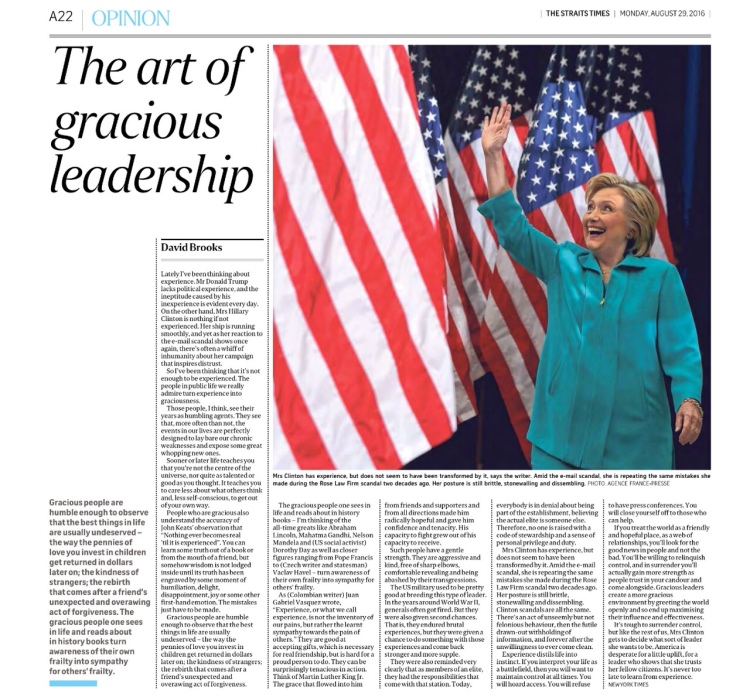
Today, we celebrate 51 years of Singapore’s independence and 51 years of calling Singapore HOME…a place where we have HOpe and MEmory. This is no mean feat for a small nation where survival and success are two sides of the same coin.
In our Op-Ed (Straits Times, 2 June 2016) “Getting to the future with honour”, we said Singapore has the opportunity to set the benchmark for a “First World Society”. To do so, we start by establishing a culture of honouring, moving deliberately from me-centredness to other-centredness for the collective long-term well-being of both current and future generations of Singaporeans.
A First World Society is one that is not only economically successful, but is also socially successful, where the elderly and the disabled, the invisible people and the forgotten people, can each have their place in society. It is a society where people honour each other with due consideration, not for the praise of others but because it the right and good thing to do. If those who reach the top do not look out for those lower down, society will disintegrate.
Many might say: It is already difficult enough for me to take care of myself and my family, why should I even bother to honour others?
Well, the following two studies show that being other-centred is actually “enlightened self-interest” as love and concern for others reap satisfied lives for ourselves.
HARVARD STUDY ON HAPPINESS
As mentioned on page 11 of our book, “Winning with Honour“, Harvard University conducted an epic study over 75 years to determine what human beings need to live a happy life.
The Harvard Grant Study began in 1938 and followed 268 Harvard undergraduate men who came from all walks of life. Over 75 years, researchers followed developments in the men’s lives and tracked a wide range of psychological, anthropological, and physical traits, including intelligence levels, alcohol intake, relationships, and income.
Dr George Vaillant led the study from 1972 to 2004 and published the fascinating findings in a book entitled: “Triumphs of Experience: The Men of the Harvard Grant Study” (Belknap Press 2012).
The study revealed six secrets to living a happy life:
- Secret #1: Value Love Above Everything Else. The most important finding is: “Happiness is love. Full stop.” There are two cornerstones of happiness: “One is love. The other is finding a way of coping with life that does not push love away.”
- Secret #2: Relationships Matter a Lot. Relationships with other people matter more than anything else in the world. This applies to overall life satisfaction, as well as career satisfaction. Early relationships are significant – those who had warm childhood relationships with their mothers were more effective at work, and earned about USD 87,000 more per year compared to men who had uncaring mothers; they were also less likely to develop dementia later in life. Men who had warm childhood relations with their fathers were less anxious as adults, enjoyed vacations more, and had increased “life satisfaction” at age 75. While we cannot do anything about our past, we can take steps to help the children in our spheres of influence today.
- Secret #3: Beware Alcohol and Cigarettes. There is a strong correlation between alcohol abuse and neurosis, mental illness, and depression. Alcohol, coupled with cigarette smoking, significantly contributed to morbidity and early death. Also, alcoholism was found to be the leading cause of divorce.
- Secret #4: Be Content. When it comes to work, one should aim for contentment, not cash. This finding is aligned with a 2010 study by Angus Deaton, an economist who was awarded the Nobel Memorial Prize in Economic Sciences in 2015. According to Deaton, increases in annual income beyond USD 75,000 do not increase emotional well-being. Hence, money matters…but only up to a point.
- Secret #5: It is Never Too Late to Change. The study found that it is possible for those experiencing hard situations to find happiness and, with the appropriate coping mechanisms, to turn suffering into lessons. Men who did well in old age did not necessarily do well in mid-life, and those who did well in mid-life did not necessarily do well in old age. The background that one was born into also had no correlation to one’s happiness.
- Secret #6: It is Mostly Up to Us. The study found that physical health after age 80 is less determined by our genes and more by our habits prior to age 50. According to Vaillant: “The credit for growing old with grace and vitality, it seems, goes more to ourselves than to our stellar genetic makeup.”
TRANSCENDENCE, OUR HIGHEST NEED
We also mentioned on page 15 of “Winning with Honour” a study conducted by Abraham Harold Maslow (1908–1970), an American psychologist who hypothesized that the needs of human beings lay in a hierarchy where once one level of needs is met, the next higher level of needs gains prominence.
Maslow identified five levels of needs:
- Biological and Physiological Needs (e.g. food, air, water, shelter)
- Safety Needs (e.g. security, stability, law)
- Love Needs (e.g. family, friends, sense of belonging)
- Esteem Needs (e.g. status, reputation, achievement)
- Self-Actualization Needs (e.g. the realization of one’s potential)
Further research has concluded that the list is incomplete: human beings have three more needs:
- Cognitive Needs (e.g. understanding a situation or knowing the reason for having to do something)
- Aesthetic Needs (e.g. beauty, balance, form)
- Transcendence Needs (e.g. thinking of others, helping others realize their potential)
The research finds that the highest need is not Self-actualisation (“me-centredness”) but Transcendence (“other-centredness”). The final hierarchy of eight needs is shown in the diagram “Maslow’s “Extended” Hierarchy of Needs”.

The highest need we all have is to move beyond just thinking of ourselves to contributing to the lives of others by doing good for their lives. To put it simply, if we want to live a happy life, we have to remember that it is not about ourselves, but about others.
HONOUR & HAPPINESS
Relationships are what define life. Unfulfilling, dysfunctional, and abusive relationships impact our lives negatively, while honourable, meaningful, and positive relationships empower us to fulfil our potential.
What we learn from the Harvard Grant Study and Maslow’s “Extended” Hierarchy of Needs is that
- Relationships and love matter more than any other thing
- Material things matter only up to a point
- Our habits and mind-sets determine our lives
- It is never too late to change
- We must take self-responsibility for our own satisfaction and happiness
- Transcendence is our highest need as human beings
A FIRST WORLD SOCIETY WE CAN CALL HOME
We live satisfied lives when we have long-term loving relationships, and trust is the most important currency for any long-term relationship to thrive, be it in the
- Personal space (i.e. families, friends, relatives, etc.)
- Professional space (i.e. customers, business partners, bosses, and colleagues, etc.)
- Public space (i.e. government, communities, etc.)
And Honour is the foundation of trust – for a system of Honour to work and for trusting relationships to be established, honour must first be offered by one party and reciprocated by the other party on an on-going basis.
We build trust most fundamentally by Honouring our Word and Honouring Each Other.
A first world society is one that is not only economically successful and viable, but is one where its members looks out for each other’s well-being. The secret to life satisfaction is to remember that at the end of the day, it is not about ourselves, but about others.
For Singapore to be HOME, offering HOpe and MEmory to Singaporeans today and the generations to come, we need to be a people who honour our word and honour each other.
Will you honour our HOME, Singapore?






